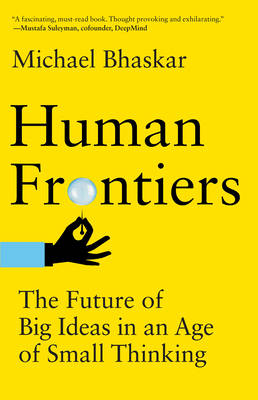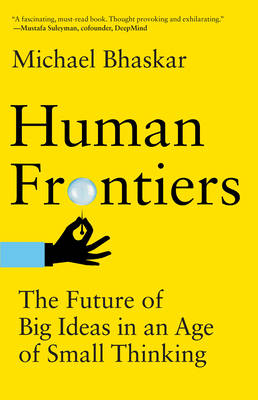
- Retrait gratuit dans votre magasin Club
- 7.000.000 titres dans notre catalogue
- Payer en toute sécurité
- Toujours un magasin près de chez vous
- Retrait gratuit dans votre magasin Club
- 7.000.000 titres dans notre catalogue
- Payer en toute sécurité
- Toujours un magasin près de chez vous
Human Frontiers
The Future of Big Ideas in an Age of Small Thinking
Michael Bhaskar
Livre broché | Anglais
27,95 €
+ 55 points
Format
Description
Why has the flow of big, world-changing ideas slowed down? A provocative look at what happens next at the frontiers of human knowledge. The history of humanity is the history of big ideas that expand our frontiers--from the wheel to space flight, cave painting to the massively multiplayer game, monotheistic religion to quantum theory. And yet for the past few decades, apart from a rush of new gadgets and the explosion of digital technology, world-changing ideas have been harder to come by. Since the 1970s, big ideas have happened incrementally--recycled, focused in narrow bands of innovation. In this provocative book, Michael Bhaskar looks at why the flow of big, world-changing ideas has slowed, and what this means for the future. Bhaskar argues that the challenge at the frontiers of knowledge has arisen not because we are unimaginative and bad at realizing big ideas but because we have already pushed so far. If we compare the world of our great-great-great-grandparents to ours today, we can see how a series of transformative ideas revolutionized almost everything in just a century and a half. But recently, because of short-termism, risk aversion, and fractious decision making, we have built a cautious, unimaginative world. Bhaskar shows how we can start to expand the frontier again by thinking big--embarking on the next Universal Declaration of Human Rights or Apollo mission--and embracing change.
Spécifications
Parties prenantes
- Auteur(s) :
- Editeur:
Contenu
- Nombre de pages :
- 432
- Langue:
- Anglais
Caractéristiques
- EAN:
- 9780262545105
- Date de parution :
- 02-08-22
- Format:
- Livre broché
- Format numérique:
- Trade paperback (VS)
- Dimensions :
- 140 mm x 220 mm
- Poids :
- 521 g







